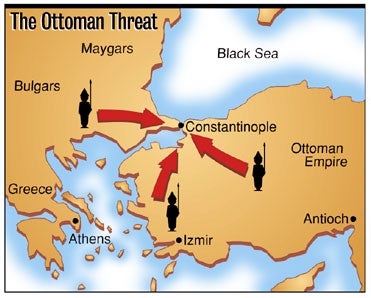ITHACA, NY—The Byzantine Empire, the Eastern continuation of the Roman Empire, is in grave danger and will soon fall to united armies of Ottoman Turks, Cornell University history professor Wallace Schroeder warned Monday.

In a speech delivered to more than 300 students, Schroeder said that the Empire, having never fully recovered its unity and strength following the violent sacking of Constantinople by Christian crusaders in 1204, remains a severely truncated shadow of its former self. Once a powerful bulwark against the Muslim armies of the Middle East and Anatolia, the Byzantine Empire now faces its most formidable threat yet, the Ottoman Turks.
“It is clear that this situation is very grave indeed for the Byzantines,” Schroeder said during the one-hour address in Room 101 of Uris Hall. “By this point, their army consists entirely of mercenaries and inexperienced would-be landholders who are serving temporary stints in the military, merely in the hopes of being granted huge amounts of farmland in the central Anatolian plain under the greatly unprofitable ’feudal levy’ system. This rather ragtag bunch is altogether no match for the extraordinarily well-trained janissaries of the upstart Ottoman clans.”
The U.S., long interested in the Byzantine Empire for its strategic location and close proximity to Eastern spice and silk markets, is following the developments closely.
“The stability of Byzantium is extremely important to the United States,” said U.S. Sen. Claiborne Pell (D-RI), a member of the Senate Foreign Relations Committee. “Certainly we’re concerned about the Ottomans’ ambitions and the threat they pose to the security of the spice routes. Rest assured we’ll be in close contact with the Venetian city-state and the Frankish duchies on this matter.”

Despite a pledge of full military support from President Clinton and the threat of severe U.S. economic sanctions against the Ottomans, many seriously question the Byzantines’ ability to withstand a Turkish siege.
“Even if the United States were to deploy 20,000 of its finest horse-mounted warriors to the Near East and cut off all opium exports to the Turks, it is still unlikely that that would be enough to stem the tide of history,” said Arthur V. Wills, a Duke University professor of Near Eastern Studies and noted Byzantine scholar. “The reality is, U.S. aid or not, the once-great Byzantine Empire will in all likelihood not survive the 1290s.”
Philip A. Brannock, visiting professor of Near Eastern Studies from Cambridge University, agreed. “I must concur with my esteemed colleague,” Brannock said. “How easily we forget what an imposing force the Ottoman Turks are. Even an extremely capable and prestigious ruler like Holy Roman Emperor Charles V bent to their will, eventually ceding much of his Hungarian possessions to them.”
While the volatile Byzantine situation is drawing the attention of scholars and government officials, perhaps no one is monitoring the developing crisis more closely than Kathleen Altman, a Cornell sophomore majoring in English.
“Professor Schroeder said that everything through the end of the Hundred Years War is going to be on the midterm,” the 19-year-old from Syosset, NY, said, “so I guess we’ll definitely have to know all the stuff about the Ottomans. Oh, my God, I have to pass that test.”
Byzantine Emperor Constantine XI could not be reached for comment.







